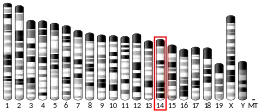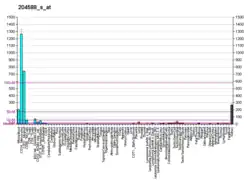Y+L amino acid transporter 1
Y+L amino acid transporter 1 is a protein that in humans is encoded by the SLC7A7 gene.[5][6]
| SLC7A7 | |||||||||||||||||||||||||||||||||||||||||||||||||||
|---|---|---|---|---|---|---|---|---|---|---|---|---|---|---|---|---|---|---|---|---|---|---|---|---|---|---|---|---|---|---|---|---|---|---|---|---|---|---|---|---|---|---|---|---|---|---|---|---|---|---|---|
| Identifiers | |||||||||||||||||||||||||||||||||||||||||||||||||||
| Aliases | SLC7A7, LAT3, LPI, MOP-2, Y+LAT1, y+LAT-1, solute carrier family 7 member 7 | ||||||||||||||||||||||||||||||||||||||||||||||||||
| External IDs | OMIM: 603593 MGI: 1337120 HomoloGene: 88701 GeneCards: SLC7A7 | ||||||||||||||||||||||||||||||||||||||||||||||||||
| |||||||||||||||||||||||||||||||||||||||||||||||||||
| |||||||||||||||||||||||||||||||||||||||||||||||||||
| |||||||||||||||||||||||||||||||||||||||||||||||||||
| |||||||||||||||||||||||||||||||||||||||||||||||||||
| |||||||||||||||||||||||||||||||||||||||||||||||||||
| Wikidata | |||||||||||||||||||||||||||||||||||||||||||||||||||
| |||||||||||||||||||||||||||||||||||||||||||||||||||
References
- GRCh38: Ensembl release 89: ENSG00000155465 - Ensembl, May 2017
- GRCm38: Ensembl release 89: ENSMUSG00000000958 - Ensembl, May 2017
- "Human PubMed Reference:". National Center for Biotechnology Information, U.S. National Library of Medicine.
- "Mouse PubMed Reference:". National Center for Biotechnology Information, U.S. National Library of Medicine.
- Torrents D; Estevez R; Pineda M; Fernandez E; Lloberas J; Shi YB; Zorzano A; Palacin M (January 1999). "Identification and characterization of a membrane protein (y+L amino acid transporter-1) that associates with 4F2hc to encode the amino acid transport activity y+L. A candidate gene for lysinuric protein intolerance". J Biol Chem. 273 (49): 32437–45. doi:10.1074/jbc.273.49.32437. hdl:2445/176951. PMID 9829974.
- "Entrez Gene: SLC7A7 solute carrier family 7 (cationic amino acid transporter, y+ system), member 7".
- Pfeiffer, R; Rossier G; Spindler B; Meier C; Kühn L; Verrey F (January 1999). "Amino acid transport of y+L-type by heterodimers of 4F2hc/CD98 and members of the glycoprotein-associated amino acid transporter family". EMBO J. ENGLAND. 18 (1): 49–57. doi:10.1093/emboj/18.1.49. ISSN 0261-4189. PMC 1171101. PMID 9878049.
Further reading
- Lauteala T, Sistonen P, Savontaus ML, et al. (1997). "Lysinuric protein intolerance (LPI) gene maps to the long arm of chromosome 14". Am. J. Hum. Genet. 60 (6): 1479–86. doi:10.1086/515457. PMC 1716131. PMID 9199570.
- Pfeiffer R, Rossier G, Spindler B, et al. (1999). "Amino acid transport of y+L-type by heterodimers of 4F2hc/CD98 and members of the glycoprotein-associated amino acid transporter family". EMBO J. 18 (1): 49–57. doi:10.1093/emboj/18.1.49. PMC 1171101. PMID 9878049.
- Borsani G, Bassi MT, Sperandeo MP, et al. (1999). "SLC7A7, encoding a putative permease-related protein, is mutated in patients with lysinuric protein intolerance". Nat. Genet. 21 (3): 297–301. doi:10.1038/6815. PMID 10080183. S2CID 38960307.
- Sperandeo MP, Bassi MT, Riboni M, et al. (2000). "Structure of the SLC7A7 gene and mutational analysis of patients affected by lysinuric protein intolerance". Am. J. Hum. Genet. 66 (1): 92–9. doi:10.1086/302700. PMC 1288352. PMID 10631139.
- Mykkänen J, Torrents D, Pineda M, et al. (2000). "Functional analysis of novel mutations in y(+)LAT-1 amino acid transporter gene causing lysinuric protein intolerance (LPI)". Hum. Mol. Genet. 9 (3): 431–8. doi:10.1093/hmg/9.3.431. PMID 10655553.
- Noguchi A, Shoji Y, Koizumi A, et al. (2000). "SLC7A7 genomic structure and novel variants in three Japanese lysinuric protein intolerance families". Hum. Mutat. 15 (4): 367–72. doi:10.1002/(SICI)1098-1004(200004)15:4<367::AID-HUMU9>3.0.CO;2-C. PMID 10737982. S2CID 29088822.
- Shoji Y, Noguchi A, Shoji Y, et al. (2003). "Five novel SLC7A7 variants and y+L gene-expression pattern in cultured lymphoblasts from Japanese patients with lysinuric protein intolerance". Hum. Mutat. 20 (5): 375–81. doi:10.1002/humu.10140. PMID 12402335. S2CID 23833183.
- Strausberg RL, Feingold EA, Grouse LH, et al. (2003). "Generation and initial analysis of more than 15,000 full-length human and mouse cDNA sequences". Proc. Natl. Acad. Sci. U.S.A. 99 (26): 16899–903. Bibcode:2002PNAS...9916899M. doi:10.1073/pnas.242603899. PMC 139241. PMID 12477932.
- Mykkänen J, Toivonen M, Kleemola M, et al. (2003). "Promoter analysis of the human SLC7A7 gene encoding y+L amino acid transporter-1 (y+LAT-1)". Biochem. Biophys. Res. Commun. 301 (4): 855–61. doi:10.1016/S0006-291X(03)00054-8. PMID 12589791.
- Gerhard DS, Wagner L, Feingold EA, et al. (2004). "The status, quality, and expansion of the NIH full-length cDNA project: the Mammalian Gene Collection (MGC)". Genome Res. 14 (10B): 2121–7. doi:10.1101/gr.2596504. PMC 528928. PMID 15489334.
- Sperandeo MP, Paladino S, Maiuri L, et al. (2005). "A y(+)LAT-1 mutant protein interferes with y(+)LAT-2 activity: implications for the molecular pathogenesis of lysinuric protein intolerance". Eur. J. Hum. Genet. 13 (5): 628–34. doi:10.1038/sj.ejhg.5201376. PMID 15756301.
- Sperandeo MP, Annunziata P, Ammendola V, et al. (2006). "Lysinuric protein intolerance: identification and functional analysis of mutations of the SLC7A7 gene". Hum. Mutat. 25 (4): 410. doi:10.1002/humu.9323. PMID 15776427.
- Puomila K; Simell O; Huoponen K; Mykkänen J (2007). "Two alternative promoters regulate the expression of lysinuric protein intolerance gene SLC7A7". Mol. Genet. Metab. 90 (3): 298–306. doi:10.1016/j.ymgme.2006.11.007. PMID 17196863.
- Cimbalistiene L; Lehnert W; Huoponen K; Kucinskas V (2007). "First reported case of lysinuric protein intolerance (LPI) in Lithuania, confirmed biochemically and by DNA analysis". J. Appl. Genet. 48 (3): 277–80. doi:10.1007/BF03195224. PMID 17666782. S2CID 24454281.
This article is issued from Wikipedia. The text is licensed under Creative Commons - Attribution - Sharealike. Additional terms may apply for the media files.




